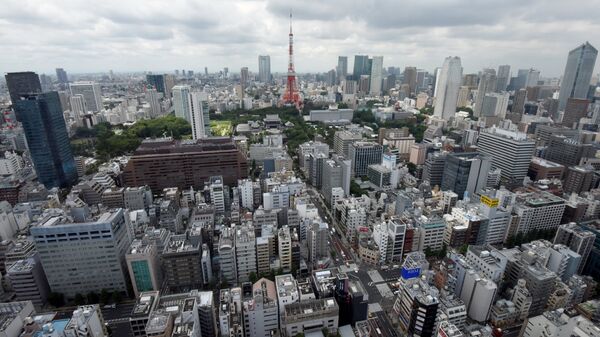MOSCOW (Sputnik), Tommy Yang — A controversial "anti-conspiracy" law passed by Japan’s parliament on Thursday could damage mutual trust between Japanese people and lead many to enact self-censorship, experts told Sputnik.
Less Social Trust
The upper house of Japan’s parliament, known as the Diet, approved the bill, endorsed by the ruling Liberal Democratic Party and its junior coalition, Thursday, as thousands of people protested outside. The new bill makes it illegal to plan to commit 277 criminal actions, from arson to copyright infringement.
Japanese Prime Minister Shinzo Abe said the new law could help protect the nation from terrorism threats, in anticipation of hosting major international sports events such as the 2019 Rugby World Cup and the 2020 Olympics.
"With the Tokyo Olympics and Paralympics being held three years from now, we want to conclude the United Nations Convention against Transnational Organized Crime as early as possible and cooperate firmly with the international society to prevent acts of terrorism," Abe said at his office in Tokyo after the passage of the legislation.
But many critics, including a United Nations official, expressed concerns over the law’s broad coverage, which could allow law enforcement authorities to arrest and punish people even in the planning stages of a crime.
He expressed concerns over the risks of arbitrary application of this legislation given the vague definition of what would constitute the "planning" and the inclusion of an overbroad range of crimes, which are apparently unrelated to terrorism and organized crime.
Colin P.A. Jones, a professor at Doshisha Law School in Kyoto, believes the new legislation could harm mutual trust among ordinary Japanese, as the new bill could easily get an innocent person framed for a criminal intent.
"The new bill could make people less likely to trust each other," Jones told Sputnik.
Jones gave an example of the offense of child abuse. He said Japanese authorities encouraged citizens to call the police whenever they suspect such a crime is taking place. With the new law in place, it would much easier for people to report on others of criminal offenses, as long as they claim others intent to commit a crime, he added.
Japan’s police force continued to expand, amid steady decline in the country’s crime rate in recent years. The new bill could finally give Japanese police officers some new crimes to solve, Jones said.
"Police in Japan don't have enough to do. The new bill could create new crimes that were not happening before," the professor said.
In addition, organized crimes in Japan, an intended target of the new bill, also fell to all time low last year.
The number of regular members of crime syndicates in Japan, as of the end of 2016, fell 10 percent from a year before to some 18,100, slipping below 20,000 for the first time since 1958, the oldest year for which data are available, according to figures released by the National Police Agency (NPA) in March.
At the same time, latest figure from the NPA showed Japan’s police force expanded to 294,700 in 2015, about 15,000 more than a decade ago, when crime rates were far higher. The ratio of officers to population is very high, especially in Tokyo, home to the world’s biggest metropolitan police force with about 46,000 police officers protecting a population of around 13.5 million.
Self-Censorship
Japanese legal experts also believe that the new law could further restrict freedom of expression in Japan, leading many young people to start refraining from uttering their opinions.
"Mass media has already been under the government’s control in Japan. With the new bill, more and more young people in Japan will be afraid of speaking up and start to implement self-censorship," Kanako Takayama, a professor of criminal law at Kyoto University, told Sputnik.
Despite steady drop in recent years, suicide rate in Japan remains high among developed countries. Japan's suicide rate stood at 17.3 per 100,000 people in 2016, while the US suicide rate is around 13 per 100,000, and the United Kingdom is under 10.
Japan’s Health Ministry said in March that 21,897 people committed suicide in 2016, down from more than 30,000 in 2011 and the lowest number since 1994. It was the seventh straight year that the number of suicides had declined.
Following revelations of massive surveillance program in the United States, revealed by former National Security Agency (NSA) employee Edward Snowden in 2013, Japanese authorities may have become interested in introducing a similar extensive intelligence collection network in Japan, Takayama said.
Takayama believes the Abe administration plans to utilize the surveillance system in Japanese language to keep tabs on any sign of activities opposing the government’s policies.
"My internet connection at home was under cyberattack, when I was involved in anti-rearmament protests before," she said.
Even videos posted on the Internet about the protests would become inaccessible after a while, Takayama added.






